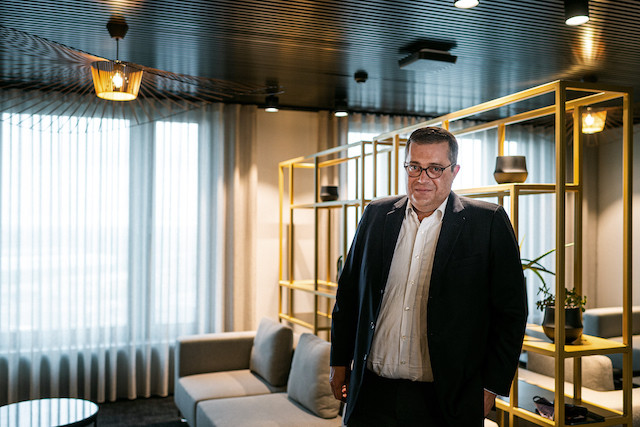Psaila, who was elected the firm’s managing partner in October 2017 at age 39, joined Deloitte as a junior in 1995. It was through the company that he initially came to Luxembourg--the first time in January 1999, when he was sent to the grand duchy for a five-week exchange.
It was an exchange, he says, “which gave me the first taste for the international experience. I then went back home to Malta and was sent for two years to Budapest, Hungary, where I also spent time with Deloitte. At that point I had decided living on an island is not something I want to do any longer--as much as living on an island evokes sentiments of sunshine and holidays--and decided that it was a good time in my career to move permanently.”
He returned to Luxembourg in April 2001 and has specific memories: of driving on the wrong side of the road, the Utopolis (now Kinepolis) punctuating the stretch of fields on the Kirchberg plateau, a quieter city centre. Walking into Luxembourg City then, for example, he recalls there was “not a soul. I said, where have I landed? In Malta, it’s a Mediterranean country, people are out and about, but that has also changed a lot after 20 years. [Luxembourg] City lives much more.”
Keys to integration
At the time he arrived, he says he was one of the few Maltese living in the grand duchy. As of the start of 2021, there were 313 Maltese nationals living in Luxembourg, +39% compared to one decade ago.
“There is a relatively large Maltese community in Luxembourg, but I'm not really integrated in that community for the simple reason that when I got here 20 years ago, Malta was not in the European Union,” Psaila says. “Many of the people that moved to Luxembourg did so in the context of Malta [joining] the European Union [in 2004], so I built my network before that happened. That’s remained very much that way.”

Psaila says learning French was one of the keys to integration. Photo: Mike Zenari
Psaila says one of his goals when he arrived, which undoubtedly helped that integration, was to make sure he was fluent in French. “I had a scholarly knowledge of French, coming from two years in secondary school, but never could speak it, and I made it the point that I would become fluent because I think it is something which is essential to proper integration,” he adds.
He has also made efforts to learn Luxembourgish and says he is “on my way” for the nationality. “I’ve done my [nationality] courses, I have to file my paperwork to get nationality, but it’s something which is important to me because I believe, having lived half my life more or less in this country, it is normal to be able to participate in the democratic processes of the country and be able to vote. I think it's a perfectly rational next step.”
In his free time, he says he enjoys walking in the Mullerthal region or coming across picturesque, off-the-beaten track areas in the city centre; reading; listening to music across genres including rock, classical and jazz. “I do enjoy the intimacy of den Atelier,” he says.
Although he says there are too many good restaurants to name, “If I had to mention one, it would be Ma Langue Sourit”, adding that he enjoys Henri Ruppert’s pinot noirs and Abi Duhr’s whites.
It might surprise some to learn that Psaila is also a perfume collector, which he says isn’t far from wine tasting, both “sensory hobbies”.
“I like anything that touches the senses,” he explains. “I like detecting what notes are in a perfume and I usually have very good ideas of what my alter ego is wearing, just by using the sense of smell.”
Country’s evolution
Like many expats, Psaila admits that at the start he didn’t anticipate being in Luxembourg for two decades. “My intention when I came here was to spend a couple of years and then move elsewhere, and I believe that this is not only my story but many people's story,” Psaila says. “The very fact that so many people tell this story is that there's something that Luxembourg is doing right.”
Even though he does at times feel “nostalgic” when it comes to the weather, he nevertheless praises Luxembourg’s diversity, diversification strategy into niche areas--“which have been extremely fundamental to the continued success of the financial marketplace”--and other aspects.
“It’s a safe country located where it is, within easy reach of any major European capital, [has a] strong cultural agenda, an excellent environment in which to grow a family. And yes, professional opportunities which are similar to those found in cities which are much bigger in size.”
And how has the health crisis shaped him on a personal and professional level? Despite the downsides, Psaila says it was an opportunity to learn many new things. “It was not easy, navigating through this crisis, but I view this as it having been a privilege to be in a leadership position during the crisis because it is in those times that you can really, really feel the strength of the team that you have around you and make decisions which are impactful.”
Priority at the outset, he said, was “putting people first and foremost”, and once they were equipped to work in such circumstances, “we could refocus on the marketplace.”
But there were others lessons to be drawn. “The human aspect is something which is key,” Psaila says. “I think everybody took much more awareness of how precious life is, and that there's a little bit of fragility and nothing should be taken for granted. And I feel that the sense of solidarity that came to play, especially at the outset of the crisis, was something that was quite reassuring... that those values--in a world which is sometimes quite ruthless--still prevail.”
